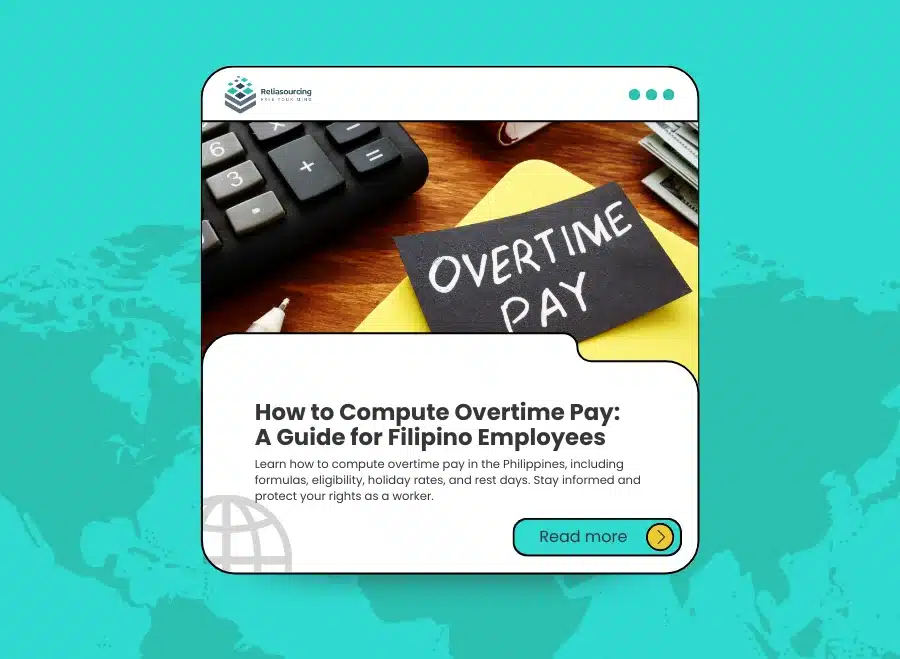Congrats, you’re now earning a living! Landing a job in the Philippines marks a significant milestone, but it also introduces you to a network of financial and legal government responsibilities beyond your base salary. As an employee, you contribute to a broader system that helps ensure societal welfare through public healthcare, retirement benefits, housing access, and social insurance, so these aren’t arbitrary deductions. They’re obligations designed to secure your future and protect you in times of need.
Some responsibilities begin the moment your employment is formalized, while others depend on how informed and proactive you are in managing your contributions and legal status. Say, you’re a recent graduate or transitioning careers, understanding your role as a contributor to the country’s labor and welfare systems is vital, so here’s a comprehensive look at what you should know as a Filipino employee:
Statutory Contributions: What Gets Deducted From Your Paycheck
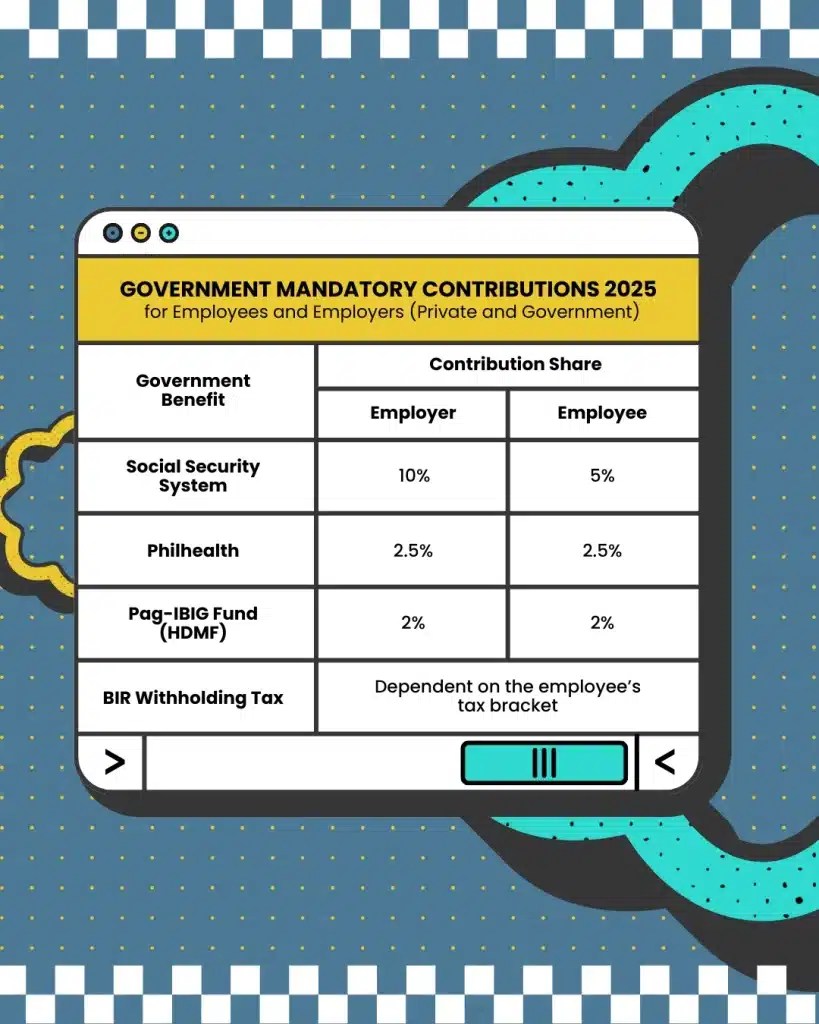
Social Security System (SSS)
As of 2025, SSS requires a total contribution of 15% of your monthly salary credit. Out of this, 5% comes from the employee and 10% is shouldered by the employer. The fund supports a range of benefits, including retirement pensions, sickness and maternity benefits, disability support, and funeral and death assistance for beneficiaries. Hence, checking if your employer remits the correct monthly contributions is essential.
PhilHealth
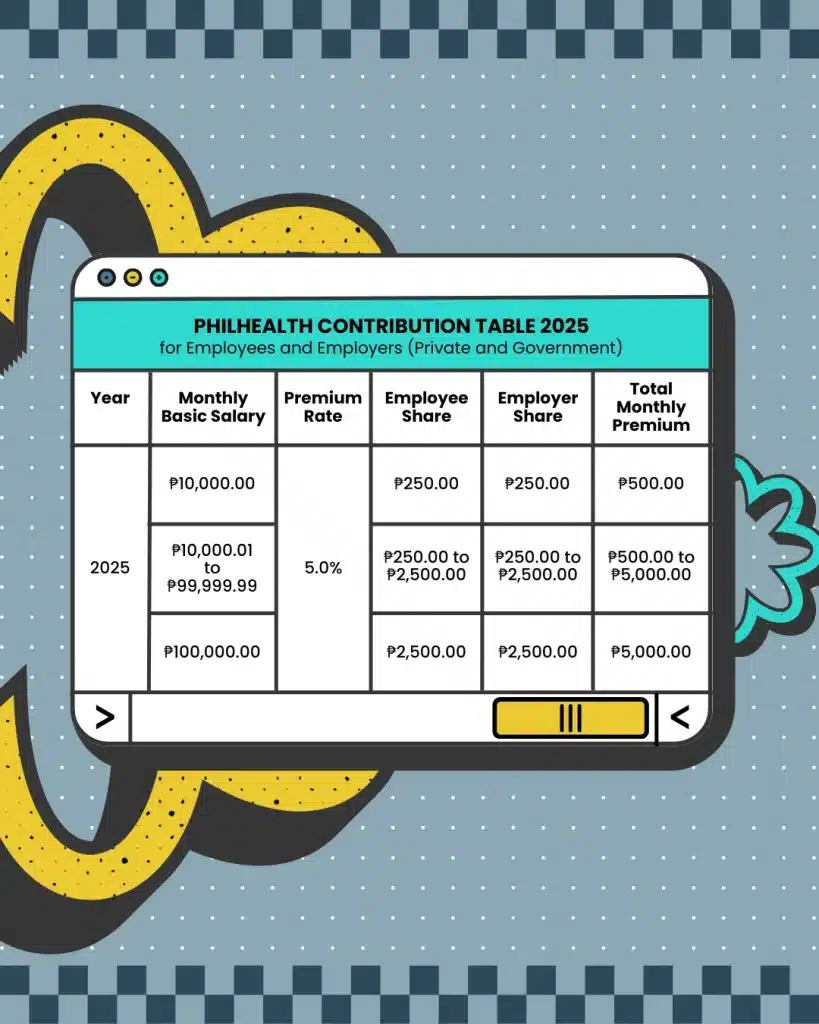
Healthcare matters, and so do your contributions to PhilHealth. By law, 5% of your basic monthly salary is allocated to this health insurance provider, equally split between employer and employee (2.5% each). Contributions are capped at a salary ceiling of ₱100,000 per month, enabling members to access hospitalization subsidies, preventive health services, and other medical assistance programs. In 2025, enhanced benefit packages are expected to be rolled out under the Universal Health Care law.
Pag-IBIG Fund (HDMF)
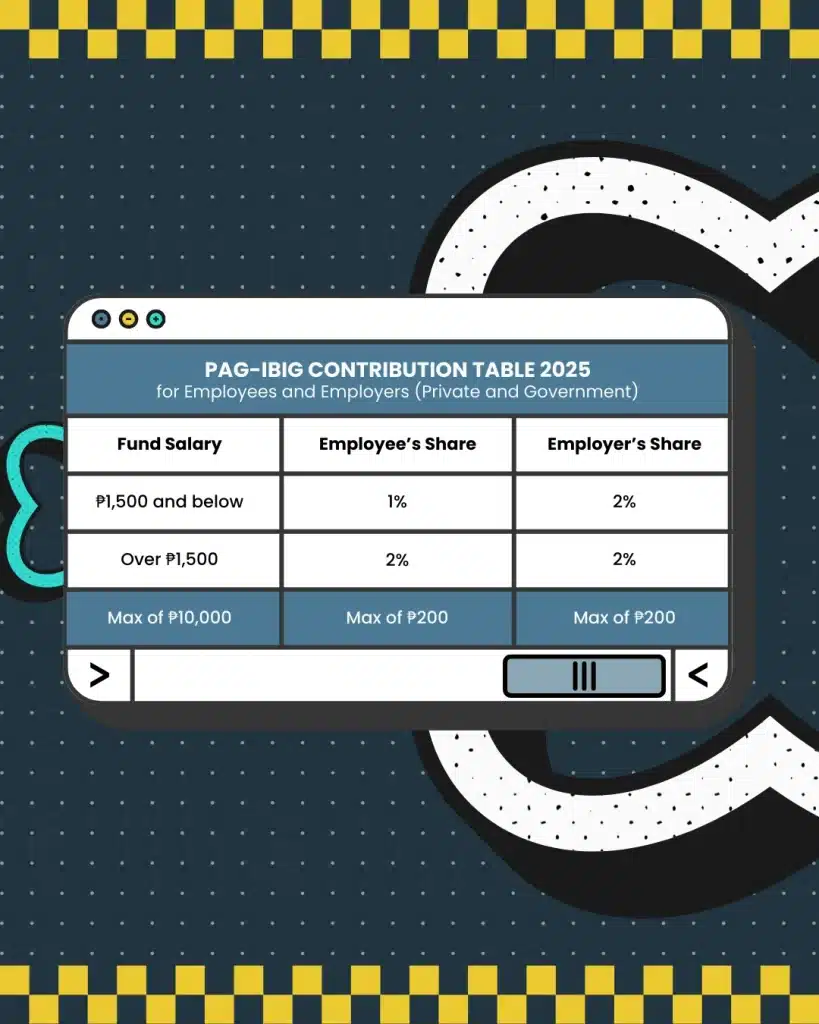
Your Pag-IBIG contributions, amounting to 2% from both you and your employer, go beyond just savings. They grant you eligibility for housing loans, calamity assistance, and multi-purpose loans. The current cap is based on a ₱10,000 monthly compensation, though members may upgrade to higher voluntary contributions to improve savings and loanable amounts.
Withholding Tax
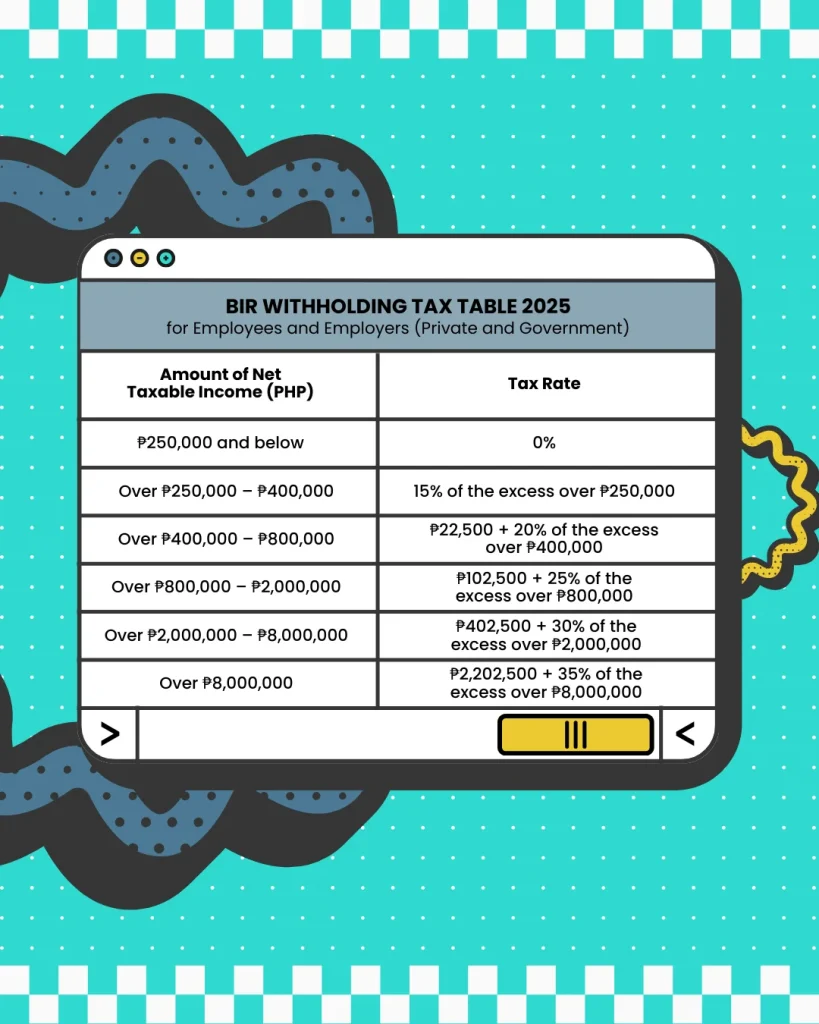
The Bureau of Internal Revenue (BIR) mandates that employers deduct and remit monthly income tax based on graduated tax rates as part of the employee's government responsibility. The amount withheld can vary depending on your salary bracket and personal exemptions, and these tax deductions fund national services such as education, infrastructure, healthcare, etc. You can use the BIR Withholding Tax Calculator to see what you have to contribute.
Legal Duties Under Labor Laws
Being employed comes with benefits and compliance. According to the Labor Code of the Philippines, employees must fulfill certain ethical and procedural obligations in the workplace. These include:
- Adhering to company rules and work schedules, including punctuality and attendance
- Performing duties with competence, integrity, and good faith
- Avoiding activities that conflict with the employer’s interests or leak confidential information
- Observing workplace standards related to occupational safety, sexual harassment, and professional behavior
Employees are also expected to give at least 30 days' written notice when resigning from a position, except in cases involving just cause, such as serious illness or contract violations. Breaching these expectations may result in penalties, loss of benefits, or even legal consequences.
Your Role in Ensuring Compliance
While your employer handles most remittances and government reporting, you're not entirely off the hook. Employees play a key role in monitoring and managing their responsibilities and contributions. Here’s how:
- Maintain updated records, including your Tax Identification Number (TIN), SSS, PhilHealth, and Pag-IBIG numbers
- Notify your employer and government agencies of changes in address, civil status, or employment
- Regularly check your payslip to ensure that deductions match government-mandated rates and responsibilities
- Enroll in online portals such as My.SSS, PhilHealth Member Portal, and Virtual Pag-IBIG to monitor your contributions and avail services
If you engage in freelancing, gig work, or own a side hustle, consider registering as a self-employed or voluntary contributor. Failing to remit contributions and accomplish your government responsibilities in such cases can disqualify you from receiving future benefits.
Why These Responsibilities Matter
It’s easy to feel discouraged when you see a chunk of your paycheck going to mandatory deductions. However, these contributions function as a form of social insurance built to protect you in the future. Understanding their long-term benefits makes it easier to appreciate their value.
- SSS provides pension income after retirement and financial aid during illness, disability, or death
- PhilHealth ensures you don’t face crippling out-of-pocket expenses for medical care
- Pag-IBIG gives you access to affordable housing and emergency financial aid
- Taxes support national programs that benefit every citizen, including roads, education, and healthcare systems
Simply, what you contribute today may carry you through difficult times tomorrow.
Need Help Navigating Employment Requirements?
Getting started in the workforce can feel overwhelming, especially when juggling job applications, interviews, and onboarding paperwork. Fortunately, you don’t have to figure it out alone. At Reliasourcing, we guide first-time job seekers not just toward employment, but toward smart, responsible employment as they navigate their government responsibilities.
We help you understand your payroll, government deductions, and labor rights, and even help with the online account setup for your government IDs. Our programs are especially tailored for niche professionals, career shifters, and even fresh graduates looking to ease into professional life.
Explore opportunities with us and take that first confident step into the world of work. Apply now at Reliasourcing Careers.
Frequently Asked Questions
What are government-mandated contributions in the Philippines?
Government-mandated contributions are mandatory deductions from your salary that fund essential social services like retirement, healthcare, and housing. These include contributions to SSS (Social Security System), PhilHealth, Pag-IBIG Fund, and withholding income tax via BIR.
How much is deducted from my salary for SSS, PhilHealth, and Pag-IBIG in 2025?
- SSS: 15% total; 5% employee share, 10% employer share
- PhilHealth: 5% of monthly salary; shared 50-50 by employee and employer
- Pag-IBIG: 2% from both employee and employer, capped at ₱10,000 monthly compensation
What is the purpose of these deductions?
The deductions serve as financial safety nets. SSS covers pensions and emergency assistance. PhilHealth helps with hospitalization and medical costs. Pag-IBIG supports housing loans, savings, and calamity assistance. Income tax funds national government services.
What happens if I work freelance or part-time?
You are considered a self-employed or voluntary member. This means you are responsible for manually paying your SSS, PhilHealth, and Pag-IBIG contributions to remain eligible for their benefits.
How can I check if my contributions are being remitted correctly?
All agencies have online portals: My.SSS, PhilHealth Member Portal, and Virtual Pag-IBIG. Register and regularly review your contributions and employment records.
Do these responsibilities change if I resign or transfer jobs?
You must give proper notice (usually 30 days) and update your employment records across government systems. Your new employer will continue the required deductions as long as your government IDs (TIN, SSS, etc.) are transferred properly.
Why do some employees have different deduction amounts?
Deductions are based on your salary and applicable caps. Someone earning ₱80,000 will have a higher PhilHealth contribution than someone earning ₱50,000. Similarly, those who voluntarily upgrade Pag-IBIG contributions will have larger deductions.
Are employers legally required to remit contributions?
Yes. Employers are legally obligated to deduct and remit your share, along with their share, to all applicable government agencies. Failure to do their government responsibilities may result in legal action or penalties.
Where can I get help understanding these better?
Reliasourcing offers onboarding assistance for fresh graduates and new hires to understand how payroll and government benefits work. If you're starting your career and want clarity, reach out through Reliasourcing Careers to learn more.
About Reliasourcing
Reliasourcing is a premier outsourcing solutions provider in the Philippines. We deliver tailored services that help businesses across industries achieve operational efficiency and scalability. With a focus on customer experience and innovation, Reliasourcing continues to be a trusted partner in unlocking potential through outsourcing.
Follow us on Facebook, Instagram, LinkedIn, YouTube, and X for more information on the latest trends and insights in outsourcing, the industry, and the Philippines.
Connect with us, or become part of our growing team today!





